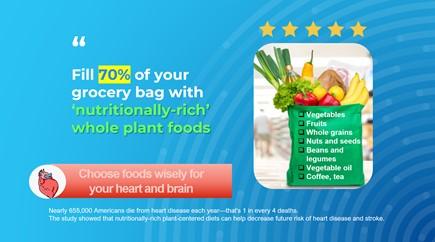New findings suggest that a plant-centered diet could help lower heart disease risk
Rockville, Maryland (June 7, 2021) — There has been a long-standing debate as to whether a low-fat or a plant-centered diet is better at lowering the risk of cardiovascular disease. A new study that followed more than 4,700 people over 30 years, found that a plant-centered diet was associated with a lower long-term risk for cardiovascular disease. However, both diets were linked with lower LDL, or bad cholesterol, levels.
“Since 1980, dietary guidelines in the United States and in Europe have recommended eating low amounts of saturated fat because of the high rates of heart disease in these regions,” said research team leader David Jacobs, PhD, from the University of Minnesota. “This is not necessarily wrong, but our study shows that plant-centered diets can also lower bad cholesterol and may be even better at addressing heart disease risk.”
The plant-centered diet emphasizes fruit, vegetables, legumes, whole grains, nuts and seeds, low-fat dairy, and fish. It also limits high-fat red and processed meats, salty snacks, sweets, and sugar-sweetened soft drinks. The low-fat diet is based on the Keys Score, a good formulation of the “low saturated fat” message, driven by saturated fat, but also including polyunsaturated fat and dietary cholesterol.
Yuni Choi, PhD, a postdoctoral fellow in Jacobs’ lab will present the research as part of NUTRITION 2021 LIVE ONLINE, a virtual conference hosted by the American Society for Nutrition (ASN).
“Our findings show that it is important to view diet quality from a holistic perspective,” said Choi. “Targeting just single nutrients such as total or saturated fat doesn’t take into account the fats that are also found in healthy plant-based foods such as avocado, extra virgin olive oil, walnuts and dark chocolate — foods that also have cardioprotective properties and complex nutrient profiles.”
The new research is based on participants in the four U.S. clinics of the Coronary Artery Risk Development in Young Adults study (CARDIA), which enrolled 5115 Black and white men and women in 1985-1986. During more than 30 years of follow up, there were 280 cases of cardiovascular disease, 135 cases of coronary heart disease, and 92 cases of stroke among the study participants.
To assess eating patterns, the researchers conducted three detailed diet history interviews over the follow-up period. These diet history questionnaires determined what participants ate and then asked them to list everything consumed in that category. For example, participants who reported eating meat in the past 30 days would be asked what meat items and how much they consumed. This was repeated for around 100 areas of the diet. Based on this information, the researchers calculated scores for all participants based on both the Keys Score of the A Priori Diet Quality Score (APDQS), which captures the plant-centered diet.
After accounting for various factors including socioeconomic status, educational level, energy intake, history of cardiovascular disease, smoking and body mass index, the researchers found that having a more plant-centered diet (higher APDQS Scores) and consuming less saturated fat (lower Keys Scores) were both associated with lower LDL levels. However, lower LDL levels did not necessarily correlate with lower future risk of stroke. Higher APDQS scores, but not lower Keys Scores, were strongly associated with a lower risk for coronary heart disease and stroke.
“Based on our study, we suggest that people incorporate more nutritionally-rich plant foods into their diets,” said Choi. “One way to do this is to fill 70 percent of your grocery bag with foods that include vegetables, fruits, whole grains, nuts, legumes, coffee and tea.”
The researchers are carrying out a variety of studies looking at how the APDQS diet score relates to various health outcomes. They are also interested in studying how different diets affect gut bacteria, which is known to influence many aspects of health and disease.
Choi will present this research on-demand during the NUTRITION 2021 LIVE ONLINE Dietary Patterns, Diet Quality, and Health 2 session from noon on Monday, June 7 through 5:30 p.m. on Friday, June 10 (abstract; presentation details).
Image available.
Please note that abstracts presented at NUTRITION 2021 LIVE ONLINE were evaluated and selected by a committee of experts but have not generally undergone the same peer review process required for publication in a scientific journal. As such, the findings presented should be considered preliminary until a peer-reviewed publication is available.
###
About NUTRITION 2021 LIVE ONLINE
NUTRITION 2021 LIVE ONLINE, held June 7-10, 2021 is a dynamic virtual event showcasing new research findings and timely discussions on food and nutrition. Scientific symposia explore hot topics including clinical and translational nutrition, food science and systems, global and public health, population science and cellular and physiological nutrition and metabolism. https:/
About the American Society for Nutrition (ASN)
ASN is the preeminent professional organization for nutrition research scientists and clinicians around the world. Founded in 1928, the society brings together the top nutrition researchers, medical practitioners, policy makers and industry leaders to advance our knowledge and application of nutrition. ASN publishes four peer-reviewed journals and provides education and professional development opportunities to advance nutrition research, practice and education. http://www.
Find more news briefs and tipsheets at: https:/
sessions, view posters and more by registering for a free pass to attend the
virtual meeting.
Media Contact
Anne Frances Johnson
[email protected]





